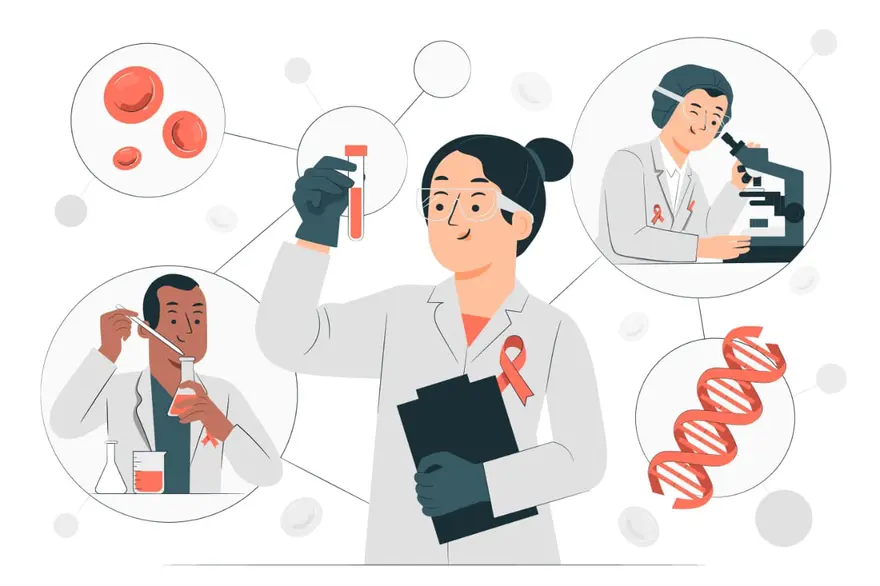Preventive Healthcare
Difference Between Hereditary & Familial Cancer

Table of Contents
Overview
When it comes to cancer, family history matters. If you have close relatives who've had certain types of cancer, you may wonder about your own risks. Two important terms to understand are "hereditary cancer" and "familial cancer." While they sound similar, there are key differences between these two categories that can impact your screening needs and preventive care. In this article, we'll clarify the distinctions, explain how to assess your family's cancer history, and discuss screening guidelines for those at higher risk of inherited cancers.
What is Hereditary Cancer?
Hereditary cancer, also known as hereditary cancer syndrome, is a genetic disorder caused by inherited mutations in specific genes that significantly increase a person's risk of developing certain types of cancer. These genetic changes are passed down from parents to children, and they can lead to a much higher likelihood of being diagnosed with cancer, often at a younger age than what is typically seen in the general population.
Some key characteristics of hereditary cancer include:
- Early onset of cancer, often before age 50
- Multiple family members affected by the same or related cancers
- Individuals developing more than one primary cancer
- Rare or unusual types of cancer occurring in the family
It's important to note that only about 5-10% of all cancers are caused by inherited genetic mutations. The majority of cancer cases are sporadic, meaning they occur due to a combination of environmental factors, lifestyle choices, and random genetic changes that accumulate over a person's lifetime.
Differentiating Between Hereditary or Familial Diseases
While hereditary cancer involves inherited genetic mutations, familial cancer is a broader term referring to patterns of the same or related cancers across multiple family members. However, familial clustering of cancer cases may not necessarily stem from a specific inherited mutation. Instead, a complex interplay of genetic and environmental factors, including similar lifestyles or exposures within a family, can contribute to familial cancer patterns.
So how can you tell if a family history of cancer signals a hereditary syndrome? Here are some clues:
- Cancer diagnoses at younger-than-average ages
- Multiple relatives with the same or related cancers
- A family member with more than one primary cancer
- Cancer in both of a paired organ (e.g., both breasts)
- Rare or uncommon cancer types clustering in the family
- More than one childhood cancer case among siblings
Familial cancer clustering can occur due to shared environmental or lifestyle risk factors among family members, such as:
- Tobacco use
- Unhealthy diet
- Lack of physical activity
- Exposure to certain chemicals or pollutants
Additionally, some families may have a genetic predisposition to cancer that isn't as strongly linked to a single inherited mutation. In these cases, multiple genetic variations with smaller individual effects might combine to moderately increase cancer risk.
Family History of Cancer
When assessing your own cancer risk, it's essential to consider your family history. While having a family member with cancer doesn't necessarily mean that you will develop the disease, certain patterns in your family tree may suggest an increased likelihood.
Here are some red flags that could indicate a hereditary cancer syndrome:
- Cancer diagnoses in multiple close relatives (parents, siblings, children)
- Cancer occurring in multiple generations (grandparents, parents, children)
- Family members diagnosed with cancer at ages younger than 50
- Individuals with multiple primary cancer diagnoses
- Rare cancers (e.g., male breast cancer, sarcoma) in the family
If you notice any of these patterns in your family, it's a good idea to discuss your concerns with a healthcare provider. They can help you assess your risk, recommend appropriate screening tests, and determine whether genetic counselling and testing might be beneficial.
What Cancers Are More Likely to Be Hereditary?
While any type of cancer can potentially have a hereditary component, some cancers are more commonly associated with inherited genetic syndromes. These include:
- Breast and ovarian cancer (BRCA1 and BRCA2 gene mutations)
- Colorectal cancer (Lynch syndrome, familial adenomatous polyposis)
- Endometrial cancer (Lynch syndrome)
- Prostate cancer (BRCA1, BRCA2, and other gene mutations)
- Pancreatic cancer (BRCA1, BRCA2, PALB2 gene mutations)
For example, women who inherit a harmful BRCA1 or BRCA2 mutation have a significantly increased lifetime risk of developing breast cancer (up to 72%) and ovarian cancer (up to 44%). Men with these mutations also face elevated risks for prostate and other cancers.
Is Cancer Always Inherited?
No, most cancers are not directly inherited. Random mutations and environmental triggers like tobacco use, diet, infections, radiation, and chemical exposures play a larger role in non-hereditary cancer development. Even with a hereditary cancer mutation, risk-reducing lifestyle changes can help lower your odds of getting cancer.
If you're concerned about hereditary cancer risk based on your family history, a genetic counselor can assess your profile and explain testing options. Genetic testing via a blood or saliva sample can identify mutations in cancer-predisposing genes, empowering you and your healthcare team to create a proactive screening and prevention plan.
Conclusion
While having a family history of cancer can be worrying, knowledge is power when it comes to managing your risk. By understanding the difference between hereditary and familial cancer patterns, exploring your family history, and partnering with genetic specialists and other healthcare providers, you can take charge of your health and make informed choices about screening, prevention, and treatment.
As a trusted name in diagnostic testing, Metropolis Healthcare is committed to providing the highest quality genetic testing services to help you understand your unique cancer risk profile. Our expert team of pathologists and geneticists leverages state-of-the-art labs and technologies to deliver reliable, actionable results. With convenient at-home sample collection and online report access, Metropolis makes it simple to get the hereditary cancer insights you need to safeguard your health and protect your family. Reach out to us today to learn more about our genetic testing offerings and how we can support you on your wellness journey.




























